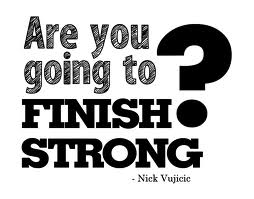Sometimes, when
know that the end of a sprint or top of a hill is just 15 seconds away—so close
that you can "see" it—I notice we do one of two things: “We”
either slow down right away, coasting to the finish without much effort – OR –
“We” buckle down and push on through the end with strength and
heart. Which person are you?
When you lose a sale, do you give up for the rest of the week, or get back on track so that one slipup doesn't get in your way?
When life gets busy, do you skip your sales preparation entirely, or do you squeeze in whatever you can, even if it's only 10 or 15 minutes?
Finishing strong isn't that much different than any other challenge or goal in life. You have to decide that you want to do it, work hard even though resistance is working against you, and then follow through until you reach the top.
Two common phrases I reflect on during these times, "Give yourself a finish that you'll be proud of," and, "Finish just as strong as you started." And that's what I want to encourage you to do as you're facing the most difficult time today.
When you lose a sale, do you give up for the rest of the week, or get back on track so that one slipup doesn't get in your way?
When life gets busy, do you skip your sales preparation entirely, or do you squeeze in whatever you can, even if it's only 10 or 15 minutes?
Finishing strong isn't that much different than any other challenge or goal in life. You have to decide that you want to do it, work hard even though resistance is working against you, and then follow through until you reach the top.
Two common phrases I reflect on during these times, "Give yourself a finish that you'll be proud of," and, "Finish just as strong as you started." And that's what I want to encourage you to do as you're facing the most difficult time today.
You will never regret choosing to work hard and climb to the top of that hill, no matter how challenging it may be or how much resistance is trying to hold you back. But you will regret giving up early, putting it off, and simply coasting to the finish line (which is a lot like backpedaling). In a race, a runner doesn't start to walk once the finish line is in sight ("Whew, I'm almost there, so I'll just relax now!"). That runner kicks it in and gives everything he or she has left until they cross that line.
So why should you
treat your own goals any differently? Your personal finish line is no less
important, and you owe it to yourself to get there without giving up. Use
whatever effort you have left so that you, too, can finish out this
quarter—that final hill—with a sprint to the finish. A finish you can be proud
of. A finish of victory!
Hail To Victory…here-here!

















